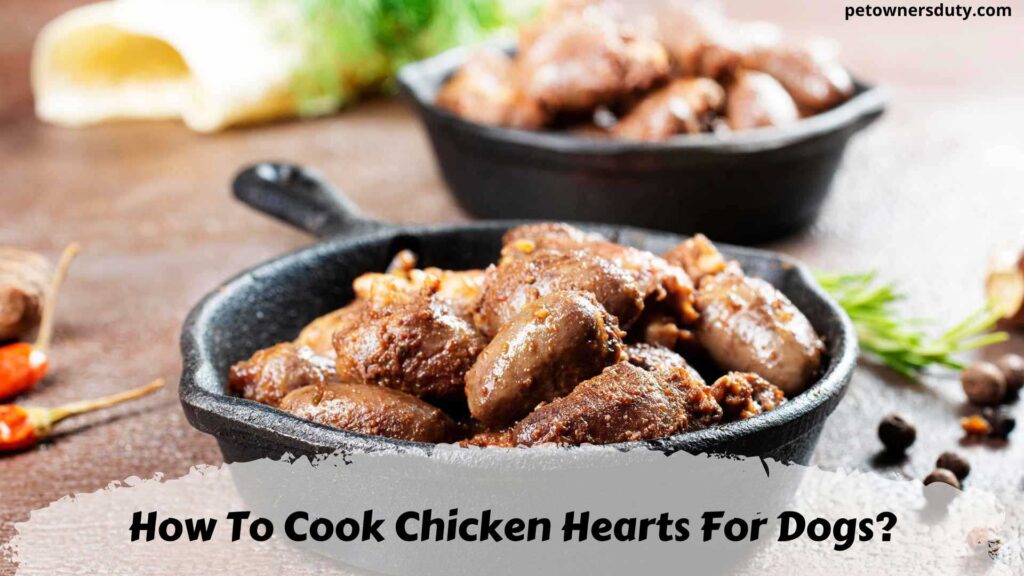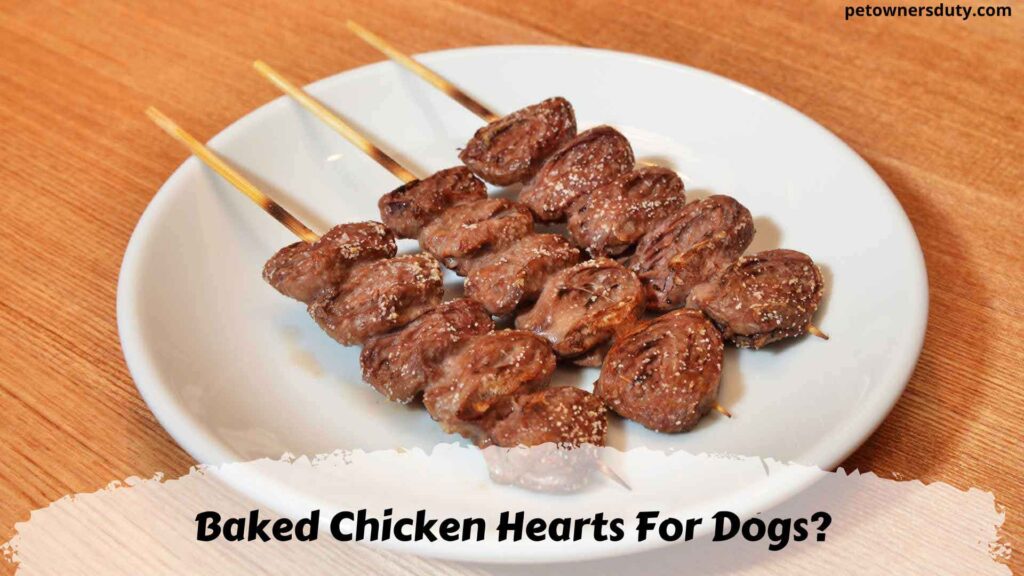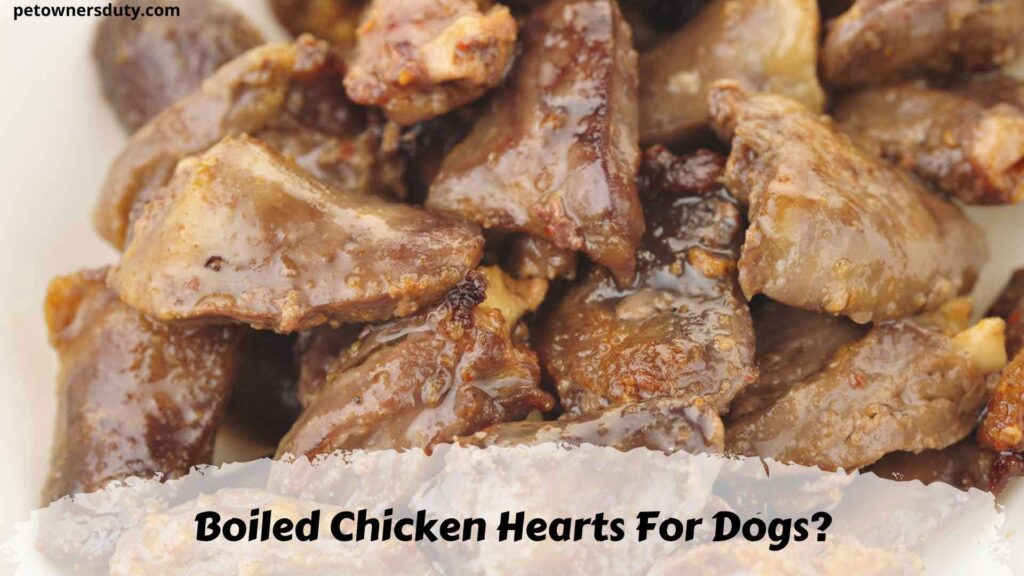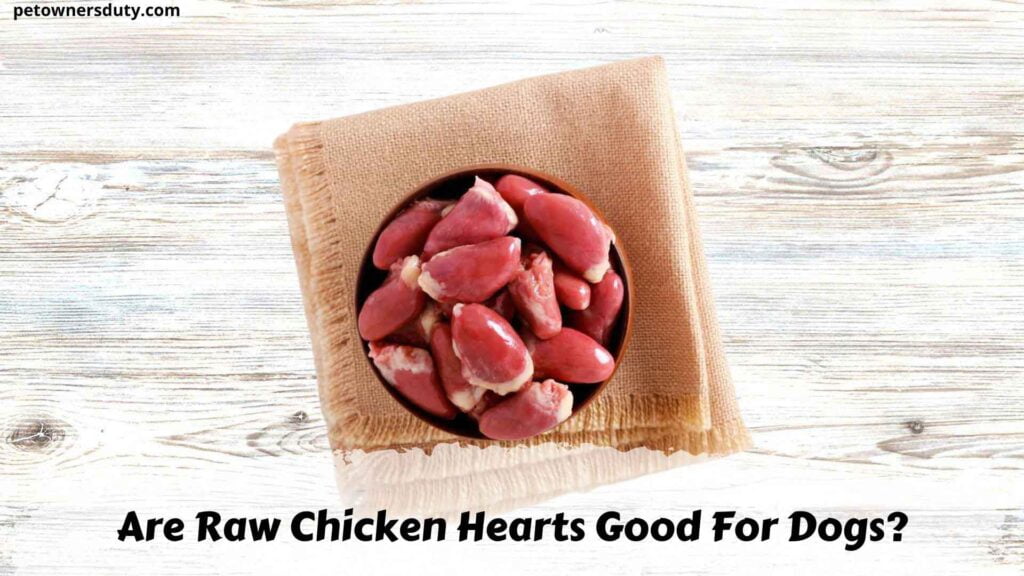Can Dogs Eat Chicken Hearts : Are Chicken Hearts Good For Dogs?

Chicken heart is an affordable and readily available protein source for dogs. But can dogs eat chicken hearts? In this post, we’ll dive into the details of feeding your dog chicken heart and explore whether or not it’s a good option for your pup.
We’ll also discuss the potential health benefits and risks of feeding your pup chicken heart so that you can make an educated decision regarding what you add to your pup’s diet.
So, if you’re wondering if chicken heart is safe for your pup and beneficial for them, read on to find out more!
Nutrition Facts For Cooked Chicken Hearts (100g)
| Calories | 185kcal |
| Protein | 26.4g |
| Carbohydrates | 0.1g |
| Fat | 7.92g |
| Sodium | 48mg |
| Calcium | 19mg |
| Iron | 9.03mg |
| Magnesium | 20mg |
| Zinc | 7.3mg |
| Copper | 0.502mg |
| Selenium | 8µg |
| Cholesterol | 242mg |
| Vitamin A | 8µg |
| Vitamin B-6 | 0.32mg |
| Vitamin B-12 | 7.29µg |
| Vitamin C | 1.8mg |
Benefits for Dogs of Eating Chicken Hearts
Chicken hearts are a excellent source of protein, amino acids, fatty acids, vitamins, and minerals, making them a fantastic addition to your pup’s diet. Not only are chicken hearts a great source of essential nutrients, but they can also help to improve your pet’s cardiovascular health.
Taurine is an essential amino acid found in high amounts in chicken hearts. Taurine can help improve heart health and lower the risk of some heart diseases.
Chicken hearts are a good source of CoQ10, an important antioxidant that helps protect the cells in the body from damage. Chicken hearts are also a great source of iron, which is necessary for healthy blood cells. Iron helps carry oxygen throughout the body, aiding your pup’s overall energy level.
Also, chicken hearts have a lot of selenium, which helps the immune system and reduces inflammation. This could help pets with allergies, skin problems, or other health problems.
For the healthiest version, look for organic, free-range chicken hearts, which will provide the highest nutrition levels. Chicken hearts are an excellent choice for your dog’s diet because they taste great, are good for them, and are easy to cook.
Potential Risks Of Feeding Chicken Heart To Dogs
Feeding chicken hearts to dogs can have potential risks, especially if the hearts come from a source that isn’t certified organic or free-range. Pesticides, antibiotics, and hormones could be in the hearts, which could be dangerous for dogs.
Also, chicken hearts can contain high cholesterol levels, which could lead to problems such as pancreatitis. Furthermore, all meats, including chicken hearts, can contain parasites and bacteria, so it’s essential to check with the supplier to ensure that the hearts have been inspected and have passed all safety standards.
If the hearts are not cooked thoroughly, dogs can become infected with Salmonella and Listeria, two bacteria that cause food poisoning.
Be mindful of the amount and frequency of chicken hearts provided to your pet, as too much could cause vomiting, upset stomach and diarrhea. When it comes to feeding chicken hearts, it is best to feed them as a supplement, not as a primary source of nutrition.
How Many Chicken Hearts Should I Give My Dog?
When it comes to feeding chicken hearts to dogs, careful consideration should be taken. While chicken hearts are rich in proteins that benefit a dog’s health, too much can lead to digestive issues. It’s recommended that chicken hearts make up no more than 10% of a dog’s diet.
The heart size should be proportionate to the size of the dog. For example, a large heart should be cut into smaller pieces to avoid choking in a smaller dog.
A small dog (under 25 lbs) should have at most 2-3 chicken hearts daily. Larger dogs (greater than 25 lbs) can be given up to 4-6 hearts. Ensure that the chicken hearts are fresh and free of contaminants before feeding them to your pet.
It is best to consult your veterinarian before giving your dog chicken hearts to ensure it is a safe and healthy option for your pet.
How To Cook Chicken Hearts For Dogs
Cooking chicken hearts for dogs is a relatively easy task that can be done quickly.

Ingredients (For 2–6 hearts servings)
Instructions
Once they have cooled sufficiently, you can serve them as a snack to your dog.
Chicken Heart Related Foods (FAQ)
Baked Chicken Hearts For Dogs?
Have you ever considered feeding your pup baked chicken hearts? This is a surprisingly healthy and delicious treat for your pup. As long as the chicken heart is cooked thoroughly, it can make a great addition as part of your dog’s diet.
Baked chicken hearts are filled with essential vitamins and minerals, such as iron, zinc, phosphorus, folate, copper, and vitamins B6 and B12. They are also a good source of protein and fat, which can help keep your pup’s coat healthy and their energy levels up.

Baking chicken hearts for dogs is a great way to give them a crunchy treat without all the extra calories and fat from deep frying.
All you need is chicken hearts, oil, and the seasoning you choose. Preheat your oven to 375 degrees Fahrenheit and prepare a baking sheet with parchment paper. Brush some oil onto the chicken hearts, sprinkle some seasoning of your choice, and spread the hearts out onto the parchment paper. Bake them in the oven for 15 minutes or until golden brown and crispy.
Let the chicken hearts cool and serve them to your pup as a tasty and healthy treat.
Boiled Chicken Hearts For Dogs?
Boiled chicken hearts for dogs is a popular dietary supplement many owners use. Boiled chicken hearts are a great source of protein, and dogs quickly absorb their nutrients and minerals. Plus, the boiled chicken hearts provide a tasty treat you and your dog will enjoy.
Boiled chicken hearts are easy to prepare. Boil them in water for a few minutes until they’re cooked through.

To feed your dog boiled chicken hearts, mix them with their regular food or give them as a treat. You can also feed them as a snack by chopping them into small pieces. The small pieces make them more accessible for your dog’s digestive system.
Boiled chicken hearts are a great way to supplement your pup’s diet with added nutrition and delicious flavor. Make sure to cook them thoroughly and only feed them in moderation. That way, you can rest assured that your pup gets the nutrition they need without any potential risks.
Are Raw Chicken Hearts Good For Dogs?
The answer to this question is both yes and no. While raw chicken hearts are a good source of lean protein and essential vitamins and minerals, they can also carry bacteria that can make your dog sick if eaten unwashed.

Make sure you are buying fresh, high-quality hearts. These should be free of any bacterial contamination or parasites.
Additionally, it is essential to note that raw meat should be fed in moderation as part of a balanced diet to ensure your pup gets all the nutrients they need. Too much chicken heart in a diet can lead to a vitamin A overdose, which can cause muscle weakness and weight loss.
Are Freeze-dried Chicken Hearts Good For Dogs?
Freeze-dried chicken hearts are a great way to give your pup some high-quality protein and a boost of essential vitamins and minerals. Freeze-drying helps retain more of the nutritional benefits of the chicken hearts than other methods like cooking or boiling.
Additionally, freeze-dried chicken hearts are naturally preserved and contain no added chemicals or preservatives. Freeze-dried chicken hearts are an excellent choice for those looking to provide their pup with a healthy, natural treat.
They are easily digestible and contain various nutrients, such as protein, vitamins A, B, D, and E, and essential minerals. Dogs love the taste of these treats; they are a great way to reward your pup for good behavior.
Freeze-dried chicken hearts can also supplement a homemade diet for dogs, as they provide a concentrated source of essential nutrients.
Dehydrated/Dried Chicken Hearts For Dogs?
If you’re looking to add some variety to your dog’s diet, dried chicken hearts for dogs are a great way to give your canine companion an exciting and delicious snack.
Dehydrated or dried chicken hearts for dogs are also easy to store and serve, making them a convenient snack option for busy pet owners. Dry dog food is easy to chew and digest.
In addition, they are portable and mess-free snacks that can be taken anywhere. You can feel confident that your pup is getting a nutritious snack that they will enjoy whether you feed the treats as is or incorporate them into homemade dog treats.
Final Thoughts
Yes, chicken hearts are a great way to give your dog some high-quality protein and essential vitamins and minerals. Chicken hearts can make a great occasional treat for your pup. However, they should be fed in moderation, as they are high in fat and cholesterol.
Make sure to remove any fat or connective tissue and cook them thoroughly before feeding them to your dog. This will help ensure your pup enjoys safe, nutritious snacks and avoids any potential food-borne illnesses.



